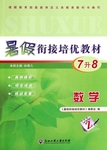
7.He always hard struggle, (preserve)
他始终保持艰苦奋斗的作风。
 新课标快乐提优暑假作业陕西旅游出版社系列答案
新课标快乐提优暑假作业陕西旅游出版社系列答案 暑假衔接培优教材浙江工商大学出版社系列答案
暑假衔接培优教材浙江工商大学出版社系列答案 欣语文化快乐暑假沈阳出版社系列答案
欣语文化快乐暑假沈阳出版社系列答案科目:高中英语 来源: 题型:
When Glen Kruger picked a small cat from an ani?mal shelter,he did not expect much. Yet right from the start,eight years ago,there was an uncommon con?nection between him and the small black cat. He 1 her Inky.
"I grew up on a hundred-acre farm and had only cats 2 playmates ”, Kruger,the seventy-year-old man,says. "My hearing was damaged by the 3 of farm equipment? so I learnt to connect with 4 . They react to what they see and what you do.”
Inky was a gentle cat,5 the house with five other cats. But on a January night,Inky did 6 that would set her apart from 7 cats forever.
Kruger had gone down to the basement to 8 the wood stove for the night. When he finished,he 9 to the top of the stairs and reached to turn off the lights. In doing so,he slipped and 10 his back against an old shelf. The heavy shelf came crashing down and sent Kruger down the stairs.
11 in a pool of blood on the basement floor,Kruger felt 12 going into shock (休克) .He shouted for help,13 his wife,Brenda,was asleep in their bedroom at the opposite end of the house.14 Kruger noticed Inky watching from the top of the stairs.
"Go get Brenda," Kruger said to Inky.
Inky 15 to the bedroom door and scratched 16 until Brenda opened it. Then Inky led her to the 17 . Brenda found her husband 18 the stairs and called 911. Kruger was rushed to the hospi?tal. "I spent six months 19 there,"says Kruger. "Although I became lame,I was blessed. "Since the accident,Inky has 20 left Kruger's side.
1.A. gave B. chose
C. named D. remembered
2.A. like B. as
C. except D. among
3.A. sound B. alarm C. noise D. voice
4.A. animals B. friends
C. farmers D. neighbours
5.A. sharing B. visiting
C. dividing D. discovering
6.A. anything B. nothing
C. something D. everything
7.A. familiar B. lovely
C. ordinary D. outstanding
8.A. shut out B. shut off C. shut down D. shut up
9.A. marched B. flew
C. struggled D. climbed
10.A. bent B. hit
C. shook D. pulled
11.A. Falling B. Lying
C. Appearing D. Thinking
12.A. it B. itself C. him D. himself
13.A. and B. but C. or D. so
14.A. Thus B. Otherwise C. Then D. Rather
15.A. walked B. ran
C. returned D. withdrew
16.A. rapidly B. suddenly C. madly D. urgently
17.A. bedroom B. basement C. yard D. house
18.A. at the bottom of B. in the middle of
C. at the top of D. in the front of
19:A. regretting B. resting
C. relaxing D. recovering
20. A. never B. ever
C. still D. already
查看答案和解析>>
科目:高中英语 来源: 题型:
In Englandthree foreign gentlemen came to a bus stop. They studied the information on the post sign and decided which bus to take. About five minutes later the bus they wanted came along. They prepared to get on. Suddenly people rushed onto the bus and tried to push them out of the way. Someone shouted insulting remarks about the foreigners. The bus conductor came rushing down the stairs to see what all the trouble was about. The three foreign gentlemen looked puzzled and ashamed. No one had told them about the British custom of lining up for a bus so that the first person who arrived at a bus stop is the first person to get on the bus.
Learning the language of a country isn't enough. If you want to ensure a pleasant visit, find out as much as possible about the manners and customs of your hosts. You will probably be surprised just how different they can be from your own. A visitor toIndiawould do well to re?member that people there consider it impolite to use the left hand for passing food at table. The left hand is supposed to be used for washing yourself. Also in India, You might see a man ap?parently shaking his head at another and assume(认为) that he is disagreeing. But in many parts of India a rotating(旋转) movement of the head is a gesture that express agreement or accept?ance. Nodding your head when offered a drink inBulgariais likely to leave you thirsty. In that country, you shake your head to express "yes"― a nod means "no".
In Europe it is quite usual to cross your legs when sitting,talking to someone,even at an important meeting. Doing this when meeting an important person in Thailand, however,could cause offence(冒犯) .It is considered too informal an attitude for such an occasion. Also when in Thailand avoid touching the head of an adult― it's just not done.
Attitudes to women vary considerably around the world. In Japan, for example, it is quite usual for men to plan evening entertainments for themselves and leave their wives at home.
Knowing about customs and attitudes is useful when you are traveling,but you also need to know the language used to express different degrees of formality(礼节) .
( ) 1. The three foreign gentlemen looked puzzled and ashamed because .
A.they didn't know the English language
B.the bus conductor told them to jump the queue
C.they didn't know the custom of lining up for a bus
D.they thought they were looked down upon
( ) 2. What's the meaning of the underlined word "insulting" in Paragraph1?
A. modest B. entertaining C. misunderstanding D. rude
( ) 3. The underlined sentence"Nodding your head when offered a drink in Bulgaria is like- ly to leave you thirsty" means in Bulgaria .
A.you are probably thirsty if you nod your head
B.you're possibly eager to have a drink if you nod your head
C.you probably refuse to drink when you nod your head
D.you'd like to have a cup of tea because you nod your head
( ) 4. We can infer from the passage that .
A.in Asian countries, women are equal to men in every field
B.learning a language well is the most important before going abroad
C.attitudes to women vary from country to country
D.in Japan, men are still the centre of the family
查看答案和解析>>
科目:高中英语 来源: 题型:
I don't know how I became a writer, but I think it was because of a certain force in me that had to write and that finally burst through and found a channel. My people were of the working class of people. My father, a stonecutter, was a man with a great respect and veneration(崇敬) for literature. He had a tremendous memory, and he loved poetry, and the poetry that he loved best was naturally of the rhetorical kind that such a man would like. Nevertheless it was good poetry, Hamlet's Macbeth, Mark Antony's Funeral Oration, Grey's Elegy, and all the rest of it. I heard it all as a child;I memorized and learned it all.
He sent me to college to the state university. The desire to write,which had been strong during all my days in high school, grew stronger still. I was editor of the college paper, the col?lege magazine, etc.,and in my last year or two I was a member of a course in play writing which had just been established there. I wrote several little one-act plays, still thinking I would become a lawyer or a newspaper man,never daring to believe I could seriously become a writ?er. Then I went to Harvard,wrote some more plays there, became obsessed with(着迷于) the idea that I had to be a playwright, left Harvard,had my plays rejected, and finally in the autumn of 1926, how,why,or in what manner I have never exactly been able to determine. But probably because the force in me that had to write at length sought out its channel, I began to write my first book in London. I was living all alone at that time. I had two rooms―a bedroom and a sitting room―in a little square in Chelsea in which all the houses had that familiar, smoked brick and cream-yellow-plaster look.
( ) 1. We may conclude,in regard to the author's development as a writer,that his father
A.made an important contribution
B.insisted that he choose writing as a career
C.opposed his becoming a writer
D.insisted that he read Hamlet in order to learn how to be a writer
( ) 2. The author believes that he became a writer mostly because of .
A. his special talent B. his father's teaching and encouragement
C. his study at Harvard D. a hidden urge within him
( ) 3. The author .
A.began to think of becoming a writer at Harvard
B.had always been successful in his writing career
C.went to Harvard to learn to write plays
D.worked as a newspaper man before becoming a writer
( ) 4. The author really started on his way to become a writer .
A. when he was in high school B. when he was studying at Harvard
C. when he lived in London D. after he entered college
( ) 5. What can we learn about the author's life in the autumn of 1926?
A.He left Harvard and got married.
B.He couldn't make up his mind what to do.
C.He started his dream as a writer.
D.He began to think seriously what to do.
查看答案和解析>>
科目:高中英语 来源: 题型:
2. ―What did you think of the concert last night?
―It was brilliant. But what (impress) me most was the last piece of music.
查看答案和解析>>
科目:高中英语 来源: 题型:
2.I'm not going there again. ―They a cup of coffee, (charge)
我再也不到那儿去了---- 杯咖啡就要了我一英镑。
查看答案和解析>>
科目:高中英语 来源: 题型:
5. At the start of the class,our teacher first talked about what we had learn- ed in the p class. .
查看答案和解析>>
湖北省互联网违法和不良信息举报平台 | 网上有害信息举报专区 | 电信诈骗举报专区 | 涉历史虚无主义有害信息举报专区 | 涉企侵权举报专区
违法和不良信息举报电话:027-86699610 举报邮箱:58377363@163.com